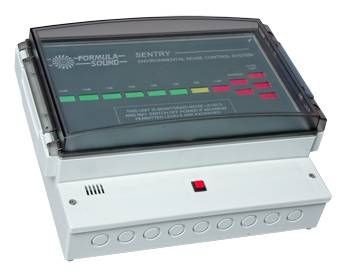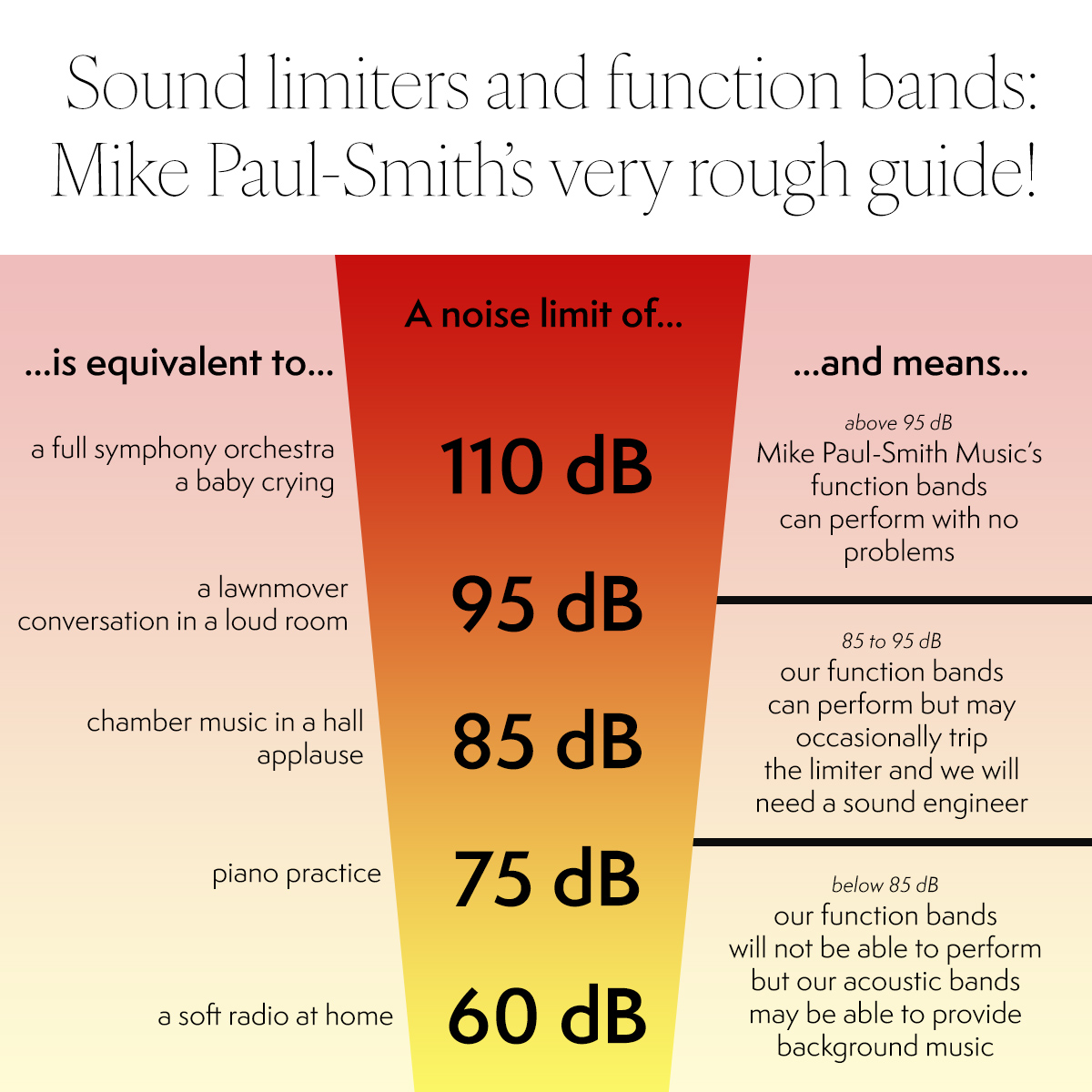Sound limiters and function bands


“Welcome to our Event Planning Advice articles.
This is a series of articles written by me – Mike Paul-Smith, the Company Director of Mike Paul-Smith Music and Down for the Count Ltd.
I’ve been running music at events since 2005 and have learnt a lot of lessons along the way. More than anything, I know that having live music at your event can be a significant investment – and I want to make sure that you make the most of it.
I hope the tips in these articles help you plan having live music at your event – whether you book one of my bands, or someone else’s. And if there is anything not covered in these articles you’d like to see, just let me know.”
Are you about to book a venue for your wedding? If yes, and you want live music, it is essential that you find out whether or not they have a noise limiter (also known as a sound limiter) before booking.
Have you already booked your venue and been told that they have a sound limiter? If so, read on to find out more about how to deal with it to get the most out of live music at your wedding. You’re also very welcome to get in touch to find out if we have any experience at that venue.
Our key message
Based on 18 years of experience of running live music at events with a noise limiter, our advice is:
1. If you really care about having live music at your wedding, try to book a venue that doesn’t have a noise limiter.
2. If you do go for a venue with a noise limiter, book a band with experience of working with them. In the case of Mike Paul-Smith Music’s bands, we have experience of working with just about every type of noise limiter – but, we do insist that you add a dedicated sound engineer to the band line-up, who can focus on noise levels and can act quickly in case anything goes wrong.
I hope this article will be helpful to anyone booking a wedding band – whether through Mike Paul-Smith Music or elsewhere.
How are volume levels regulated by venues?
I need to make it absolutely clear at the outset that I’m not writing this to criticise venues (many of whom have been forced to install a sound limiter against their wishes) – my only intention in writing this is to make sure that clients are fully informed and can make the most out of their investment when booking live music at a venue with a noise limiter. Most people only book a live band once in their lives (when they get married) and it’s therefore unlikely that they will be experts in the various ways that volume levels are managed by different venues.
I’ve had difficult conversations with venues in recent years about noise limiters and I really do understand and acknowledge that many are in a difficult position – but that being said, it is your wedding and you need to know what you’re dealing with if there is a noise limiter in place.
As licensing rules get tighter, and more wedding venues open, venues are increasingly being asked to monitor noise levels. Volume levels can be monitored and regulated in a few ways:
1. At some venues, a member of staff is asked to walk around with a hand-held sound monitoring device known as a decibel meter, measuring the noise level at the property boundary and asking the musicians to play more quietly if the volume goes over a certain level. Most bands can work with this sort of system without any problem, because it has the human touch and allows the venue and the musicians to work together.
2. At other venues, a fixed device called a sound limiter is installed which cuts off the electric power to a band above a pre-defined noise limit. Many venues have been forced to install these as a condition of their licence – perhaps because nearby residents have complained about noise levels.
3. Alternatively, some venues have installed their own PA systems which tightly control the level of the sound (one example could be installing speakers in the ceiling which directs all the sound to the dancefloor but not to their neighbours). Some of these systems are amazing, and some are simply terrible – read on to find out more about them!
What are sound limiters?
As mentioned in point 2 above, a sound limiter is an electronic device that cuts the electric power to a band (or DJ) when the volume detected by the sensor exceeds a certain limit.

Most limiters have a graphic light display which allows the musicians to see how close they are getting to the limit – and if they exceed it for a certain amount of time it cuts the sound to the band (and also turns off their stage lighting, plunging your party into a sudden, silent darkness).
When this happens someone – either a band member, or a member of venue staff – needs to reset the limiter, which takes about 30 seconds.
At this stage, you might realise one of the ironies of a noise limiter – which is that non-electric instruments can keep playing, and making noise. So the drummer and horn players can keep making noise (and they might have been the loudest to start with!) whilst keyboardists, guitarists and vocalists can do nothing but look horrified and hope that the electric surge hasn’t damaged their precious equipment.
And another irony is that there is another “acoustic” instrument in the room – the audience. Several times I have witnessed audience applause on its own trip a noise limiter, at a moment when absolutely no instruments were making any noise.
Perhaps you’re beginning to see why noise limiters are a nuisance, so here are my top tips for dealing with them.
Tip 1: check if a venue has a noise limiter before you book
I promise I’m not here to criticise wedding venues, many whom I love working with on a regular basis, but I have to say that I’ve heard so many stories about venues who have failed to disclose that they have a noise limiter until a few weeks before the wedding.
Obviously this is totally unethical – so please carefully check whether or not your venue has a noise limiter when you book. If you want live music at your wedding, please specifically ask your venue if there will be a noise limiter active at your event and get it in writing from them.
Tip 2: if your venue has a limiter, check what decibel (dB) level it is set to
If you do have a noise limiter at your venue, it’s critical that your band know what level it is set to.
Here is a very rough guide to noise levels – with the disclaimer that everything depends on whether or not the noise limiter has been installed properly, and where the sensor (the microphone which detects the noise level) is positioned in relation to the musicians.

Tip 3: don’t book a venue with a noise limit below 85 dB if you want live music
As you’ll see from the graphic above, 85 dB is about the volume of applause or chamber music in a concert hall. It’s just not realistic to have live instruments performing together for a party at a quieter volume than this (unless you’re able to provide a band that perform solely on electric instruments, including electric drums – this is not something we can offer at Mike Paul-Smith Music but we do have recommendations if this is a route you would like to go down).
If you have a noise limiter between 85 and 95 dB, most bands – including our party bands – should be able to perform, if the noise limiter is set correctly. However, in the case of Mike Paul-Smith Music’s bands, we do usually insist that you add our sound engineer to your booking if you have a noise limit between these levels. They can (1) carefully manage the volume level moment by moment, and also (2) set up in-ear monitor mixes for each musician in the band, meaning that they don’t need to rely on floor monitors – i.e. reducing the number of items making “noise” in the room.
Having said all that, there are some nightmare venues where live music is just not possible. We won’t list them but if you’re worried your venue might be one of them, get in touch for our advice.
Tip 4: check the details of the in-house PA system if your venue insists you use it
Some venues have installed their own PA systems which tightly control the volume levels using compression. This is usually fine for DJs but for bands it can make it difficult to hear vocals above acoustic instruments such as drums.
Some of these systems are brilliant and are totally manageable, and others are not. Please ask your venue for their tech specs and send them across to us for our advice, and we’ll see what we can do.
Any questions?
If you’d like to know more about sound limiters, get in touch and we can give you advice. There are certainly ways of working with noise limiters and still having a great party, but it just takes a bit more planning and thought – and we’re here to help each step of the way.
-
Recent Posts
Recent Comments
Archives
Categories
Meta

Mike Paul-Smith Music: a collective of professional musicians available to hire in a range of exclusive band line-ups.
Awards


As Featured On







Mike Paul-Smith Music is a trading name of Down for the Count Ltd, a registered company in England and Wales (10694876). VAT registration number 266786449.